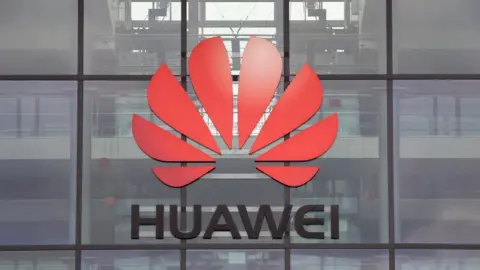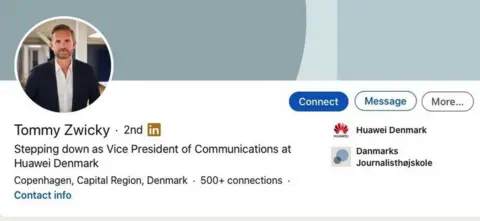Huawei: Uighur surveillance fears lead PR exec to quit
 Reuters
ReutersOne of Huawei's European communications managers has resigned from the Chinese firm over concerns about its role in the surveillance of Muslim Uighurs.
Tommy Zwicky had worked in the company's Danish office for six months and was a former journalist.
It comes after internal Huawei documents were made public, which mentioned a "Uighur alarm" system that it had worked on with Chinese facial-recognition specialist Megvii in 2018.
Huawei said it opposed discrimination.
"We provide general-purpose connectivity products based on recognised industry standards, and we comply with ethics and governance systems around emerging technology," it told the BBC.
"We do not develop or sell systems that identify people by their ethnicity, and we do not condone the use of our technologies to discriminate against or oppress members of any community."
A spokeswoman for Megvii declined to comment, but the firm has previously said its systems are not designed to target or label specific ethnic groups.
It is believed that the Chinese government has detained up to a million Uighurs in Xinjiang province in what the state defines as "re-education camps".
Beijing has consistently denied mistreatment and says the camps are designed to stamp out terrorism and improve employment opportunities.
Disputed title
Mr Zwicky had previously worked for a Danish newspaper, and before that was editor-in-chief of the Danish Broadcasting Corporation.
He officially remains under contract to Huawei until February and is unable to discuss his decision further.
He first announced his departure via Twitter and LinkedIn.
Following this, his boss characterised Mr Zwicky as being a low-level PR manager and Huawei also took issue with Mr Zwicky being described as a vice president of communications, as this signifies a senior role in its corporate structure.
However, articles published at the time of his appointment referred to the fact that this specific title had indeed been created for Mr Zwicky and quoted the chief of Huawei Denmark as saying: "Tommy is a well-known and respected name in the Danish media. With him on board, we feel confident that we can take communication to a new level."
When asked about this, Mr Zwicky told the BBC: "My title was vice president of communications at Huawei Denmark. I have no further comments."
 LinkedIn
LinkedInHis decision comes a week after French football star Antoine Griezmann ended his sponsorship deal with Huawei after raising his own concerns about "strong suspicions" that the company had been involved in developing an alert system to monitor the Uighurs.
'Confidential' tests
American surveillance research firm IPVM brought to light the Chinese-language documents on 8 December.
They were marked as confidential but were being hosted publicly on Huawei's European website.
The report referenced an "interoperability test [in which] Huawei and Megvii jointly provided a face-recognition solution based on Huawei's video cloud solution. In the solution, Huawei provided servers, storage, network equipment, its FusionSphere cloud platform, cameras and other software and hardware, [while] Megvii provided its dynamic facial-recognition system software".
Among the functions of Megvii's software that the report said Huawei had verified was a "Uighur alert".
IPVM said a separate box added to Megvii's software was capable of determining ethnicity as part of its "face attribute analysis".
The page became inaccessible shortly after the Washington Post asked the firm about its existence.
At the time Huawei said the document had referenced a "test", which had not seen a real-world application.
But the the Post later published a second article which said Huawei's site indicated it had worked with four other companies on products advertised to have ethnicity-tracking capabilities.
In response, Huawei promised to carry out a follow-up investigation, but continued to deny it sold systems that identified people by their ethnicity.
Unsatisfactory response
Concerns about both firm's activities in this area date back further,
The US added Megvii to a trade blacklist in 2019 over concerns that its tech was being used by the Chinese authorities to carry out "repression, mass arbitrary detention, and high-technology surveillance".
And the same year, a group of 13 UK MPs and members of the House of Lords published a letter raising concerns that Huawei was "facilitating a programme of ethnic repression" against the Uighurs.
The BBC has been told that about this time, Westerners working for the firm asked head office for more details about work it was doing for the Chinese authorities in Xinjiang and felt they had never got a satisfactory answer.
But one noted that this it was not uncommon for companies to be wary about discussing sensitive matters with staff.
